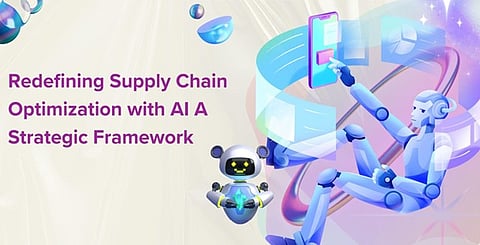

In the age of digital transformation, artificial intelligence (AI) is revolutionizing supply chain optimization. Arvindan Badrinarayanan has presented a comprehensive framework that integrates AI to enhance efficiency, visibility, and decision-making across supply chain networks. This research offers actionable insights into how organizations can strategically implement AI to navigate complex supply chains, address key challenges, and achieve transformative operational outcomes in an increasingly dynamic global marketplace.
AI-driven predictive analytics has redefined demand forecasting in supply chains, improving accuracy by up to 45%. By leveraging advanced machine learning algorithms, businesses can analyze historical data, identify trends, and predict market fluctuations with precision. This results in reduced inventory waste, better resource allocation, and enhanced responsiveness to customer demands. Predictive analytics also empowers organizations to anticipate potential disruptions, adapt to shifting market conditions, and implement proactive risk management strategies, ensuring seamless operations even in volatile environments.
The integration of IoT devices into supply chain networks has significantly improved operational visibility and data capture capabilities. Sensors placed along logistics routes and in warehouses provide real-time updates on inventory levels, transportation conditions, and environmental factors. Combined with AI analytics, IoT enables businesses to continuously monitor supply chain activities and make informed decisions. This has resulted in a 41% increase in operational efficiency, faster issue resolution, and a 55% improvement in overall decision-making speed, driving better outcomes.
AI-powered inventory management systems automate stock monitoring, reorder processes, and demand planning with unparalleled precision and reliability. These systems achieve up to a 38% reduction in inventory carrying costs while simultaneously improving turnover rates by 27%. By automating repetitive tasks and applying real-time analytics, businesses can maintain optimal inventory levels, minimize stockouts, and improve supplier collaboration. These capabilities not only enhance supply chain performance but also increase customer satisfaction, reduce waste, and lower operational expenses.
AI and real-time data processing technologies have transformed logistics operations in huge ways. Using the same data, AI systems optimize routes, making better use of the fleet and reducing delays. Dynamic route adjustment by advanced AI models decreases transportation costs by 35% and improves delivery accuracy by 42%. Such innovations ensure the agility and responsiveness of the supply chain logistics against market exigencies and in achieving customer expectations in any situation.
Pilot projects are the foundation for rolling out enterprise-wide AI in supply chains, allowing for a 'no risk' experimentation. But through something called structured methodologies, organizations can test these AI applications on a lean scale, such as demand forecasting or inventory management, to assess ROI and scalability, all while ensuring feasibility. Structured pilot implementations result in 34% deeper ROI, 28% faster project time, and improved cross-functional collaboration. Successful pilot projects improve the readiness of businesses for large-scale AI adoption, providing tools to scale AI solutions more efficiently.
A dynamic solution to address supply chain challenges in dynamic markets is provided by adaptive AI systems. Using machine learning, these systems then train models, help in making decisions, and evolve to work with real-time changing data. And the businesses reap a 45 per cent decrease in forecast error and a 36per cent increase in customer satisfaction, thanks to incorporating advanced analytics and predictive capabilities. Adaptive AI keeps supply chains resilient, and disruption-ready as well as able to maintain operational excellence on top of customer expectations.
Implementing AI in supply chains requires a robust data strategy to get the accuracy and reliability that is needed. Unity of data architectures makes systems accessible and reduces redundancy. Data quality is improved, analysis is streamlined, and all this is enabled by IoT-driven data capture, machine learning-based validation and cloud storage frameworks. As organizations build strong data governance frameworks, they are found to have higher regulatory compliance rates, stronger security and lower data-related risks to pave the way for AI-driven innovation.
As a priority, future AI in supply chains speaks to its ethical concerns, transparency, and sustainability. Adequate adoption of AI governance frameworks helps businesses to conduct AI-driven decision-making with fairness, accountability and trust. In addition, AI-driven sustainability initiatives increase resource utilization by 37% and decrease environmental impact by 31%. To achieve long-term success, innovation, and alignment with global sustainability goals an increased focus on eco-conscious practices and ethical AI applications will come into play as supply chains evolve.
In conclusion, Arvindan Badrinarayanan’s research highlights the transformative potential of AI in supply chain optimization. By strategically integrating AI technologies, organizations can achieve unprecedented efficiency, adaptability, and resilience in their operations. This framework provides a roadmap for leveraging AI to address supply chain complexities, enhance decision-making, and foster innovation, paving the way for sustainable and ethical business practices in an increasingly dynamic digital landscape.
